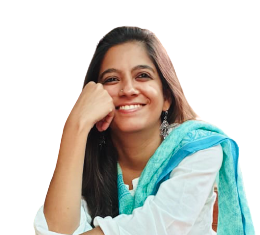Meet Our Journals Editor | Nishtha Vadehra
November 25, 2021
We are happy to announce a new addition to our staff as we welcome Nishtha Vadehra, who joins us as Editor, Journals at NLSIU. Nishtha is an editor of academic and popular nonfiction writing, with a keen interest in bridging the two. She graduated with a Bachelor’s Degree in English Literature from Lady Shri Ram College for Women, New Delhi, and a Master’s Degree in English literature from Delhi University. She has worked in book and journal publishing, as well as independently with academics, researchers, development sector organisations, artists and filmmakers.
Trained as an editor at Yoda Press, Delhi, she went on to work with the Indian Institute for Human Settlements, Bengaluru, where she anchored journal and book production; worked with researchers and practitioners to convey their work through diverse kinds of writing; conducted writing workshops for students, faculty and staff; and co-curated a city writings festival.
We spoke to her to find out more about her interests and her work.
 Can you tell us a little more about yourself and your background?
Can you tell us a little more about yourself and your background?
I have spent most of my life in Delhi, where I finished both my school and college education. In the final year of my masters, I started working part-time with a small, independent publishing house called Yoda Press, which focuses on amplifying voices that are not often heard. Incidentally, the first book I edited was ‘Law Like Love: Queer Perspectives on Law’ (edited by Arvind Narrain and Alok Gupta). I also helped out at the small bookstore run by the press called Yodakin, which was both a dream realised and checked. This was where I was trained as an editor and was exposed to the Indian publishing ecosystem.
Studying and editing texts in English make it hard to look past the inescapable privilege that the language confers—not only in terms of the networks and opportunities it opens up, but also how often command over it is conflated with merit. This is possibly why I feel drawn to teaching-learning spaces where it still seems possible to break—or at least shake—some of these patterns. My move to Bengaluru about six years ago, to work at the Indian Institute for Human Settlements, gave me one such opportunity as I worked with urban researchers, practitioners, faculty and learners across diverse disciplines and backgrounds, and helped them convey their work in a clear and accessible manner. When I’m not reading for work, I play badminton, go for hikes, read, listen to podcasts or binge on Korean dramas.
Reflections on being appointed Editor, Journals at NLSIU?
Excitement and some amount of trepidation. I had been working independently for a year or so when this happened, and intended to continue unless I found a full-time opportunity that I was genuinely excited about. So when I heard about my mix of work at NLSIU, I knew that time had come. My interests lie at the intersections between research, education, writing and publishing, and I’m looking forward to helping build an editorial and publishing programme here in the future.
In your experience of being editor, what are your favourite or cherished pieces that you have worked on? Any interesting experiences or anecdotes would be welcome!
One of the most exciting and exacting projects I’ve worked on is a Yoda Press book called ‘This Side, That Side: Restorying Partition,’ which is an anthology of graphic narratives from Pakistan, India and Bangladesh curated by Vishwajyoti Ghosh. Unlike much of the writing around the Partition (little of which looks at the partition of Bengal), this book is about how the third generation navigates its continuing impact. I have grown up hearing about the Partition from my grandparents, two of whom migrated from what is today Pakistan, so this also felt deeply personal.
It is one of the most logistically challenging books I’ve worked on, involving collaborations with close to 50 writers and graphic artists across three countries. It also gave me the chance to travel to Dhaka, Lahore and several Indian cities to promote the book.
What are your next steps as an Editor here at the University?
Initially, the aim is to read, listen and absorb—usually the first thing one does as an editor. The larger plan is to help build an editorial and publication infrastructure that responds to the needs of researchers, faculty and students at the University and helps them put their work out in the best way possible. In a more concrete sense, this means working with journal teams to streamline review and editorial processes, and shaping ‘The NLS Blog’ as a space for vibrant intellectual discussion, and, in time, building a writing centre.
Much of academic writing tends to be opaque and inaccessible—both structurally (in terms of paywalls) and in the kind of language it uses. There is no reason why scholarship, which is often publicly funded, should not be available to the public. The University’s plan of building an open-access infrastructure for all its publications in the future, is a fantastic—and rare—step towards making research accessible. As an editor, my efforts will be directed very much in this spirit: helping produce compelling writing where depth, clarity and impact go together.

